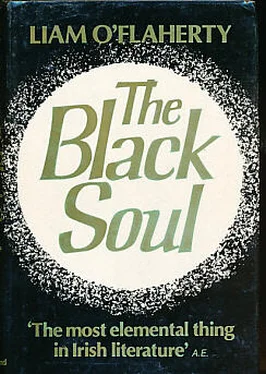She rose without speaking. It was as well to obey him. In Inverara all women obeyed their husbands, even though they hated and despised them. It was a custom, and customs are stronger than desires. She took a pair of old patched frieze trousers from a nail on the back door and threw them in the centre of the floor. On top of them she threw a heavy blue frieze shirt, an oilskin hat, a pair of raw-hide shoes, a waistcoat, a pair of woollen socks and a red muffler. She put half an oaten loaf in a handkerchief. She made tea and put it in a tin can. She tied a flannel cloth around the can to keep it warm. Then she sat again by the fire.
Red John took the clothes and went into the room on the right to dress himself. Little Mary was listening now for the sounds of footsteps. She was expecting the Stranger to come in any moment. How delicious it was to be expecting him. And she would be alone with him to-night while her husband was away. She started as a loud knock came to the door. She jumped up eagerly and unbarred it. But it was only Sean Mor, her husband’s uncle. The great bulk of the fisherman stalked into the middle of the kitchen, shaking the rain from his clothes and stamping on the floor, crying that it was the worst night for forty years. He shuffled to a stool by the fire, leaving wet footprints on the earthen floor. Then he began to talk in a loud voice to his nephew who was still in the room.
Little Mary sat by the fire again. She knew Sean Mor was looking at her with his mind as he talked with his lips, leering with those small eyes of his. He was fifty, but strong and hardy, living on the sea, and his wife was a thin consumptive woman. Once he had tried to seize Little Mary, crying with a coarse guffaw, ‘Now, if it were I who were living with you, there would be little voices in the house.’ How hateful he was, with the tobacco stains on his beard and the black dirt beneath his gnarled nails.
‘Well,’ said Red John, coming from the room and taking his can of tea, ‘in the Name of God, let us go.’ They sprinkled holy water on themselves and said ‘In the Name of the Father’ as they crossed their breasts. The rain swept sideways into the kitchen as they went. Then the door banged, the lamp flickered, and there was silence. The dog smelt the door and then curled up by the fire on Red John’s stool.
Little Mary was excited now. She was constantly shivering. Her passion surged up into her throat. She tripped around tidying the kitchen, her hips swaying like a dancer’s. She combed her long black hair and put a ribbon in it. She turned around and around in front of the mirror by the lamp. She fidgeted, standing in front of the fire. She blushed as she toyed with the breast of her bodice. Then she gasped and put her hands to her heart as she heard footsteps coming around the gable-end. She had opened the door before the knock came.
As the Stranger entered, he stumbled against her, buffeted by the storm. ‘I beg your pardon,’ he said gently, and half-turned to her before he stopped short as if he remembered that he had committed an indecency, and his face set again in a scowl. Little Mary curtsied and smiled.
The Stranger went to the centre of the room and commenced to take off his dripping oilskin coat. Little Mary paused, half-ashamed to help him until he called sharply, ‘Come, give me a hand, please.’ As his face turned to her in the half-light, she could see that he was intoxicated, but she was not afraid of that. It seemed to her to be natural that her man should drink. Drink made men wild, and wildness was of the sea and of all things that were passionate and strong and beautiful. She took the coat gently from his shoulders and hung it on a nail. The Stranger, muttering something, kicked a stool to the front of the fire, sat down with a thud and spread his hands to the blaze.
‘Will you have your supper now?’ she asked.
He looked around at her contemptuously. ‘Supper?’ he said. ‘Oh yes. Why not? I’m not hungry. Yes, of course I will.’
As she passed him going to and from the fire preparing supper, she kept looking at him, eager to speak and unable to begin. She was hoping that he would begin. After that it would be easy. But the Stranger kept silent. He had drunk several glasses of whisky in Derrane’s shebeen, and the whisky had made him gloomy and depressed, as it always does with men whose souls are troubled. He kept looking into the fire, furrowing his forehead, twitching his nostrils and cracking the fingers of his right hand restlessly. His face, lit up by the firelight, was as pale as the face of a corpse, and the high cheekbones seemed to be straining against the skin like the ribs of an old cab-horse. His spine was distinct through the back of his coat as he sat leaning forward from the hips. But his eyes were wild and fierce. They would have kept a strong man away in fear from the wrecked body that encompassed them. They stared intently, and the lashes never blinked over them. But the brows kept contracting.
He sat trying to think, but the whisky made thought incoherent and illusory. The whining of the wind seemed to enter his brain.
‘Are there eggs for me, Mary?’ he said with a start, eager to busy himself with the world about him to prevent the mad rush of past memories that he felt were coming. They always came when he sat thinking.
‘Yes, there are.’
‘Oh, well, I don’t want them.’
‘But you must eat,’ said Little Mary. ‘A person must eat to live in this weather.’
He looked at her, about to argue with her, but he remembered that she was a peasant. She would not understand. He laughed and looked at the fire again. ‘All right, Mary, I’ll eat them.’ Of course it would be ridiculous to talk to her. What in the name of the devil did she know about life? And why should he want to talk to people about important things, about life? He had come to Inverara to get rid of important things, of life. But was life important?
He clenched his hands and gritted his teeth to kill those hateful thoughts that began to rush into his mind like a shower of bullets fired in rapid succession. He moved his stool back from the fire with a nervous gesture, but the draught between the chimney and the door caught him, and he moved up again with a muttered oath. He began to tremble with rage. A dog began to bark in a cabin to the right. The roar of the sea became distinct and separate from the other sounds. He gasped and let his body go lax. He couldn’t resist his thoughts. He couldn’t govern them. With his lips wide open and a kind of wondering expression in his eyes he stared into the fire. Immediately something began to throb in his brain, like a motor, jumping back into the past. Then a door seemed to open – the door of his memory. It opened with a snap. As a whirlwind catches up suddenly a heap of snow, just around the bend of a mountain road, and lashes the countless flakes round and round in the air, the bulk remaining together in a winding column that rises higher and higher, while stray flakes drop from the white cloud, stand still for a moment and then fall into the valley beneath, so visions of his thirty years of life whirled round and round in the cell of his memory. One of them would break loose, pause for a moment at the door and then vanish. They did not come in the order of time or importance. They did not even seem to bear any relation to himself. In fact, he could see himself as if he were a stranger.
First he saw himself, a boy of twelve years, sitting in a brake with a score of other boys, some older than himself, some the same age. He was dressed in a knickerbocker suit with a belt down the back of the jacket, a school cap on his head, a cutaway starched collar over his jacket. Beside him sat a rosy-cheeked priest, with huge red hands, and his clerical waistcoat stained with snuff. The brake was approaching a large dome-shaped marble gate, with a large bronze cross over it. All the boys were silent, some smoking cigarettes. ‘Ha, ha!’ laughed the priest, ‘this is the Pearly Gate, my boys. No smoking allowed in Heaven.’ And as the brake scratched its way over the granite dust in through the school-gate, the boys with a sigh threw their cigarettes on the huge pile of other cigarettes that lay to the left of the gate, under the niche that held a statue of the Blessed Virgin.
Читать дальше












